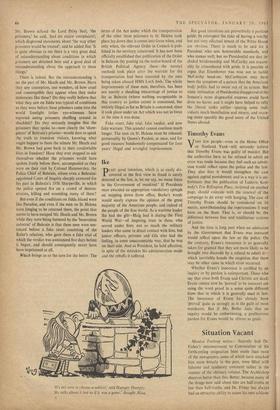Timothy Evans
VIERY few people—even in the Home Office V or Scotland Yard—still seriously believe that 'Timothy Evans was guilty of murder. But the authorities have so far refused to admit an error was made because they feel such an admis- sion would reflect upon the police and the law. They also fear it would strengthen the case against capital punishment; and in a way it is un- fortunate that the publication of Ludovic Ken- nedy's Ten Rillington Place, reviewed on another page, should coincide with the renewal of the campaign to do away with hanging. The case of Timothy Evans should be considered on its merits, notwithstanding the repercussions it may have on the State. That is, or should be, the difference between free and totalitarian systems of justice.
And the time is long past when an admission by the Government that Evans was innocent would reflect upon the law or the police. On the contrary, Evans's innocence is so generally taken for granted that they are more likely to he brought into discredit by a refusal to admit it-- which inevitably breeds the suspicion that there may be other cases in which error occurred.
Whether Evans's innocence is certified by an inquiry or by pardon is unimportant. Those who say that since both Evans and Christie are dead, Evans cannot now be 'proved' to be innocent are using the word proof in a sense quite different from that in which it is generally used in law. The innocence of E%;ans has already been `proved' quite as strongly as is the guilt of most murderers. But if Mr. Butler feels that an inquiry would be embarrassing, a posthumous pardon for Evans would be almost as good.


































 Previous page
Previous page